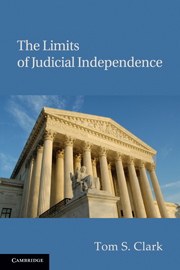Book contents
- Frontmatter
- Contents
- List of Tables
- List of Figures
- Acknowledgments
- 1 Introduction
- 2 A Political History of Court-Curbing
- 3 Conditional Self-Restraint
- 4 Court-Curbing and the Electoral Connection
- 5 Public Support and Judicial Review
- 6 Ideological Implications of Court-Curbing
- 7 The Limits of Judicial Independence
- Appendix A Elite Interview Methodology
- Appendix B Court-Curbing Bills, 1877–2008
- Bibliography
- Index
5 - Public Support and Judicial Review
Published online by Cambridge University Press: 05 August 2012
- Frontmatter
- Contents
- List of Tables
- List of Figures
- Acknowledgments
- 1 Introduction
- 2 A Political History of Court-Curbing
- 3 Conditional Self-Restraint
- 4 Court-Curbing and the Electoral Connection
- 5 Public Support and Judicial Review
- 6 Ideological Implications of Court-Curbing
- 7 The Limits of Judicial Independence
- Appendix A Elite Interview Methodology
- Appendix B Court-Curbing Bills, 1877–2008
- Bibliography
- Index
Summary
The use of judicial review to declare legislative enactments unconstitutional is perhaps the most closely examined function of the Court. Normative inquiry into the conditions that justify the use of judicial review has given rise to both a developed theoretical discussion as well as positive empirical analysis. The normative analysis of the exercise of judicial review has been the dominant question in American constitutional theory since at least the beginning of the twentieth century and continues to interest modern constitutional theorists (Thayer 1893; Bickel 1962; Ely 1980; Whittington 1999; Eisgruber 2001). In particular, normative theorists have been concerned with the so-called countermajoritarian difficulty, which refers to the tension between democratic norms of majority rule and accountability and the power of unelected judges to have a constitutional veto over democratically enacted legislation. Empirical research is more recent, at least relative to the normative scholarship. The main thrust here is to assess empirically the extent of the problem posed by the countermajoritarian difficulty. That research has examined the frequency of the Court's use of judicial review and the effect of separation-of-powers mechanisms on the Court's invalidation of majoritarian policies (Dahl 1957; Graber 1993; Segal and Westerland 2005; Whittington 2007).
Some argue the Court's power to review Acts of Congress is an essential element of the separation of powers, because it provides a mechanism for enforcing constitutional limitations on legislation. Many scholars have even suggested that the Court's power to invalidate legislation is an important reinforcement of democracy.
- Type
- Chapter
- Information
- The Limits of Judicial Independence , pp. 159 - 206Publisher: Cambridge University PressPrint publication year: 2010

